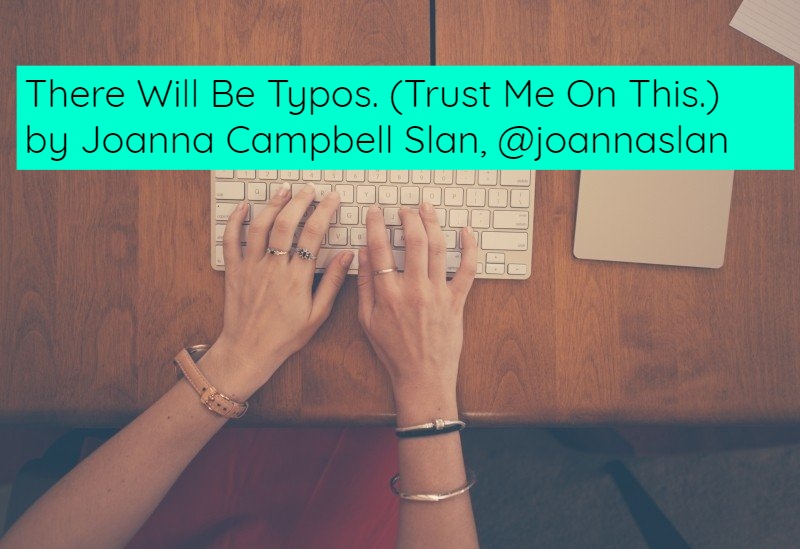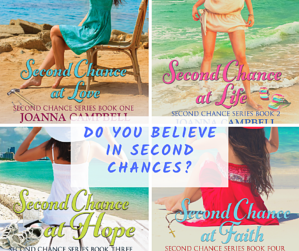By Joanna Campbell Slan, @joannaslan
New Release
March 18 marked the birthday (aka, release date) of my newest book, Second Chance at Faith: Book #4 in the Second Chance Series. There will be typos. Groan. I’m sure of it.
I’m fortunate enough to have several terrific proofreaders who read over my work before it’s available to the public. No matter how many pairs of eyes view the document, I’m always amazed at the different mistakes each person catches.
Nowhere on the Map
For example, one of my readers pointed out that there is no such place as Gibsontown, Florida. It’s actually Gibsonton.
Men, Man, Woman, Huh?
Another proofreader noticed that I kept writing Highwayman when I meant Highwaymen. I can’t explain that. I think it’s because the title is already confusing because there are 25 men and one woman. That’s my best excuse. So are they Highwaymenandwoman? Or Highwaypeople? Discerning readers will want to know.
Birds of a Feather
Another reader noticed that “snowy white egrets” should actually be Snowy Egrets. That’s their name. So, I knew they were snowy. I knew they were egrets. I didn’t know their proper name was Snowy Egrets. All this time, I thought people were being descriptive when they were being accurate. Sigh.
Sven Again?
Someone pointed out that I’d named a character “Sven” in another book, and I’m using the name again. Oh, golly. I’ve never known anyone named Sven. Ever. Somehow, Sven’s the only Scandinavian name that comes to mind when I write. Go figure. Here’s another odd factoid: My sister had our DNA tested and I’m…wait for it…Scandinavian. I had no idea. (My mother was adopted, so all this came as news.)
Actually, I Learned I Lean On That Word. Hard.
I ran the document through Grammarly, a writing program, and the computer brain behind Grammarly pointed out my repeated use of “actually.” Which I actually hadn’t noticed until Grammarly highlighted it. Actually, I did notice it, but I actually like that word. A lot.
Do Not Taunt Me With Tautology
I also learned, via Grammarly, about tautologies. A new word for me, but one I’ll never forget. Here are a few examples: In my opinion, I think… OR He sat down and took a seat.
Take a Pass at This
Over the years, I’ve learned to edit in passes. Each time I reread my work, I look for specific problems. Many of these my proofreaders miss. One is the MIA character. If a character shows up at the start of a scene (or is expected to show up), I need to explain where that character is/was/disappeared to during the scene. Another specific problem is physical placement. If a character sits down at the start of a scene, that same character cannot also later sit down. Unless he/she topples to the floor. All this might seem pretty silly and easy to track, but when you have five or six characters interacting, you need to keep an eye on all of them. If you don’t, they could be turning cartwheels in the streets.
A Rose By Any Other Name is Rosa
Yet another pass I make is the name change edit. I’ve been known to completely change a character’s name in the middle of a book. This time I swapped “Papo” for “Papa.” Fortunately, I caught that one.
Redundancy Again?
The big bombshell fell on my house when an advance reader said, “This book has a lot of redundant passages.”
Really? I wondered. Could that be true?
I sat down with the book and read it in one gulp. Bless that reader’s sharp eyes. She was right. For some unknown and perhaps unknowable reason, I repeated a certain explanation of events. Not once. Or twice. I did it three or four times. Thanks to that smart reader’s comment, I cut 3,000 words and three characters who had no business wandering around the pages of my book.
After the Fact, Sigh
Sadly, I cut all that deadwood AFTER the proofreaders saw the book. So, I am sure there will be mistakes. But given the choice between a great, fast-reading story with typos and a fat, loggy book that’s typo-free, I choose the former. Maybe someday I’ll learn to write a book, turn it over to the proofreader, and quit tinkering with it. But not this month!
 Joanna’s most recent book (that nearly killed her) is Second Chance at Faith: Book #4 in the Second Chance Series. Read it here. Commiserate with Joanna by going here.
Joanna’s most recent book (that nearly killed her) is Second Chance at Faith: Book #4 in the Second Chance Series. Read it here. Commiserate with Joanna by going here.
And check out this summer-themed cozy mystery box set from Joanna and 13 other best-selling cozy mystery authors.
Writer @JoannaSlan On Why Her Latest Book is Sure to Have Typos: Share on X



Between me, my beta readers, my critique partners, and my publisher’s editors, there are still typos in my books. Fortunately no one has changed names, but despite efforts you will see a lot of use of my favorite pet word, just.
Bless you, Alex, for your honesty. I’ve found typos in classics, award-winners, and everything in between. I don’t remember readers finding them so often until lately.
Thanks for posting today, Joanna! The ‘Svens’ made me laugh. :) I have so many names in my books that I’m trying to start keeping track (5 suspects a book x 30 books…and all old-fashioned names for the most part). Like Alex, I’m a big ‘just’ user, too.
I was into “just” for a while. (Is that awhile?) And did you notice the typo in this post? I wrote, “Many of these my proofreaders missing…” ARGH!!!! Thanks for letting me whine on your blog, Elizabeth. I need to track names better. Who’d’a thunk I’d write so many books that it would become a problem? Not I!
No, I totally didn’t notice it, ha! Which just goes to prove your point. No worries, I’ve got you covered!
That’s because we’re buds! Lucky me!
Ah, yes, typos and other such mistakes. I think every book probably has at least one. Of course it’s important to be alert for them, and to have other eyes reading a manuscript. But in the end, the best you can hope for is that they aren’t too egregious and that they don’t get in the way of a reader’s enjoyment of the story.
Margot, I had one reader “ding” me for typos and then offer me her paid services. She claimed to be an experiences proofreader. Certainly she was an expensive one. I do wonder if some of the mistake-finders are actually nefarious. Am I being old, nasty, and cynical? You betcha. On the other hand, I love the sweet people who write me and say, “Uh, Joanna? I think I found a mistake.” Like the book with the same dog in two places at once. I explained, “She’s a very talented animal.” ‘Nuff said.
Those things are all easy to miss. Until the final book comes out and then they are really obvious. LOL
Diane, I once proofread a book for a friend who had her own publishing house. The book was about proofreading. She misspelled “proofreading” on her back cover. It happens to the best of us. I have found that reading my work out loud helps. Even so, mistakes happen. Especially when you are a prolific writer.
I think you’re misusing the term “proofreader.” I think you mean “copy editor.”
Proofreading happens after the manuscript has been thoroughly copyedited and has been printed. The “proof” is then checked by the proofreader for quality before the book is published. The proofreader takes the original edited copy and compares it to the proof, making sure that there are no omissions, missing pages or awkward word or page breaks. If the proofreader notices many typos or other errors in the text it is returned for copyediting.
There are many articles on the internet that define the difference between copyediting and proofreading.
It sounds to me like what you have is a bunch of readers who help you find errors in your work. That’s fine. But in the end, you should use a professional copy editor. The amateurs (yes, English teachers and writers who are not trained editors are amateurs in this case) don’t know what they don’t know and may introduce as many errors as they correct. Hire a real, trained, experienced copy editor at least once. (Not just someone who calls themselves an editor.” You’ll be surprised at the result and how much you learn.
Farris, you are right that I should probably find someone else to help me. However, I’ve also been edited by professional editors from the big traditional publishers, and mistakes also cropped up in those books. And yes, you are correct that I’m talking about proofreaders and copy editors interchangeably, and they aren’t the same thing. To the layman (or lay reader?), a proofreader is the one who is tasked with finding typos. To those of us who write for a living, there are developmental editors, acquisition editors, copy editors, book production specialists, proofreaders, and line editors. Also researchers. I might be wrong, but I think the terms also vary depending on the publishing house.
Thanks for sharing this Joanna. There’s some comfort in knowing everyone’s been there! I received a nice review from a reader saying she noticed a few grammatical errors but they weren’t too distracting. Yes myy proofreader missed them, but glad to know that self-publishing means it’s pretty simple to resubmit corrected files to POD and eBooks.
And Brenda, at least we DO make corrections. Legacy publishers rarely did. At least, I never noticed them fixing stuff. As for the reader who noticed grammatical errors, there’s also the problem that depending on the style book you use, those might NOT be errors. Take the Oxford comma, for an example. If you have a series and put a comma before the “and,” you are using the Oxford comma. It does add clarity. However, many publisher have gone to fewer commas. So a reader might take exception. Also, what about dialogue? Should a character say, “To whom am I speaking?” Well, shucks. That creates a certain persona, doesn’t it? And what about the reader who is just plain wrong? Like the one who “dinged” my Jane Eyre books because of when I dated the Irish potato famines. You see, while we tend to think of one great famine, there were actually a series of famines over many years. So my reader’s comment stands, and I can’t defend myself!
I had to chuckle about the Oxford comma issue…I realized I have to pick one way and be consistent. Do you use it or not? I agree that there are some things done by choice or style or character voice that readers might consider an error. I write middle-grade fiction so my books are just over 30,000 words. A quick read through provided me a couple of items to note and I will correct those and resubmit the manuscript. Too funny about the potato famine dating issue! My books are each set in a different state and use real locations there so I’m waiting for the day that a reader lets me know that the local ice cream parlor is on the other side of town😂or some such detail. Guess I’ll be grateful if they are reading that carefully?
I like the Oxford comma. Years ago, I taught writing to the executives at State Farm Insurance. I stumbled across an example of why the Oxford comma is important. A will specified that Mary, John and Sam were to be given equal shares. A court case ensued, positing that as it was written, Mary would get half while John and Sam would split half the money. Of course, there’s also “Eats, Shoots and Leaves” or “Eats Shoots and Leaves,” and variations. Point being: The purpose of punctuation is to clarify. Often that extra comma does exactly that. So…I use it.
And yes, when a reader points something out, I am always thrilled that he/she cared. I never take offense…unless they are nasty.
Typos are going to get passed over. That is a sad fact. I don’t like when it happens to me.
I feel a kindred spirit with your book. My birthday is on March 18. :)
Teresa C.
Teresa C., Happy Birthday belatedly!
I recently found a pair of typos in the paperback version of a book that had originally been release in hardback. Just curious, I checked the hardback copy at the library. Yup, same typos were there, too.